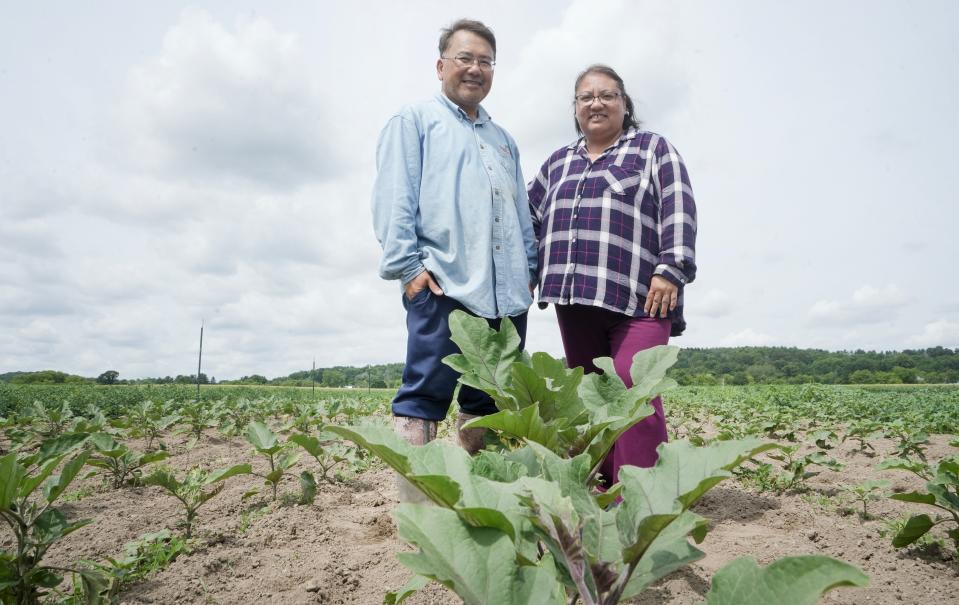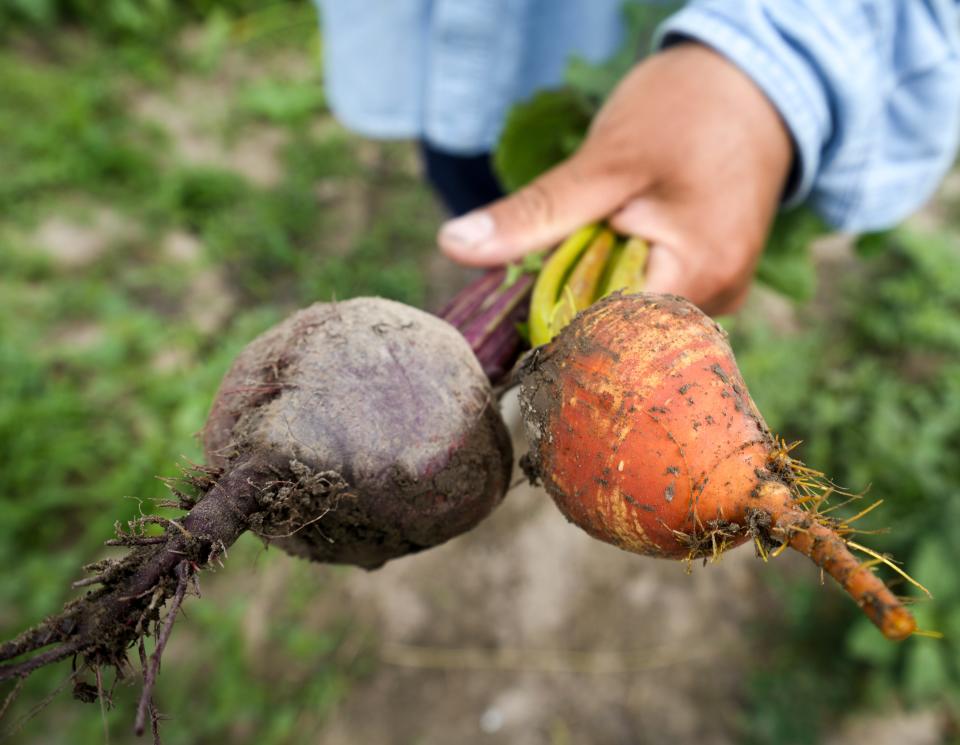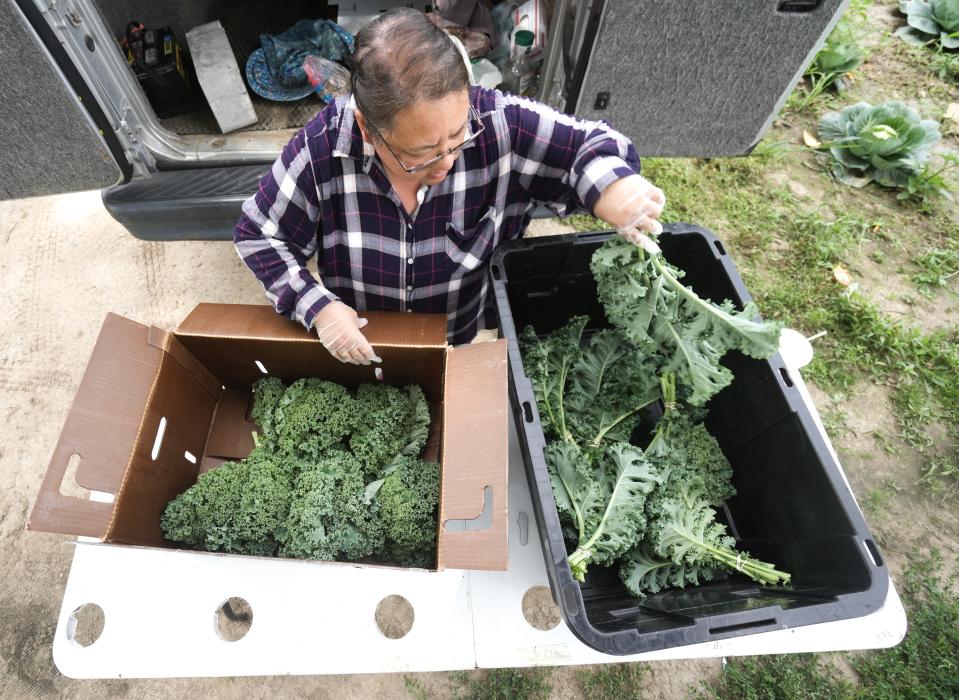Program pays Wisconsin farmers to feed their neighbors in need. They hope it sticks around.
In northwest Wisconsin's Dunn County, hundreds of students leave their final class each Friday during the school year with a bag full of food to make sure they and their families get enough to eat over the weekend.
The "SAM bags," short for "Share A Meal," are a project of Stepping Stones of Dunn County, the area food pantry. And when apples are in season, each bag includes some from Mary Dirty Face Farm.

Rachel Henderson owns and operates the farm with her husband, who named it after a reference to someone listed as "Mary Dirty Face" in a history of the town. Together, the couple grows more than 60 apple varieties on an 11-acre orchard near Menomonie. Henderson said she loves thinking about kids hopping on the bus and heading home with something she grew.
"It makes my heart warm," she said.
But what's happening here is more than just a feel-good partnership. Stepping Stones and Henderson's farm are part of a new program that pays farmers to provide fresh, nutritious products to food banks and pantries across the state.
The Wisconsin Local Food Purchase Assistance Program began last year and is now in its second season. In late May, the program announced a new wave of 125 farmers who were each awarded between $5,000 and $25,000 to supply food to pantry partners, including fruits, vegetables, meat, eggs and specialty products like honey. In addition to combatting hunger, those involved with the program say it's a valuable tool to teach farmers how to scale up their business to a bigger market that can help them net more cash.
Funding for the program, which comes from the state Department of Agriculture, Trade and Consumer Protection, is set to last only through June of next year. Advocates are hoping that won't be the end of the road on what they feel is a big step toward building a more local, sustainable food system.
"Something like this does not happen overnight," said Tara Roberts-Turner, general manager of the Wisconsin Food Hub Cooperative, which ships participating farmers' products across the state. "We're going to need more time ... to get this program to make the impact we need it to make."
Food pantry clients get fresh, local produce
A number of groups are involved with moving the food from farm to pantry. First, the farmer will work with staff from Marbleseed, an organic farming nonprofit, to create their contract, make projections about how much food they'll sell and set their prices.
About every week, a driver for the food hub cooperative will stop at the farm and pick up food items that have been packed into boxes for shipping. Those boxes then get distributed to individual pantries and to food banks, like Hunger Task Force in Milwaukee, which supply their own networks of pantries. The help is meaningful in Wisconsin, where more than 617,000 residents are food-insecure, according to Feeding America.
Stepping Stones of Dunn County contracted this year with five local producers who are getting paid through the program, said food pantry manager Angie Wolf. In addition to Henderson's apples, the pantry will receive ground beef, ground pork, eggs and produce, including some from a Hmong farmer growing different types of lettuce, corn, onions, radishes and beets that Wolf said are popular with the county's Hmong population.

Close to 40% of the producers picked for this year's program grants are Black, Indigenous and other people of color, more than half are new or beginning farmers, and 42% of the farms are women-owned. That diversity has a two-pronged effect: It gives historically under-resourced groups a leg up in the world of agriculture — which remains overwhelmingly white and male — and also means food pantry users can find more culturally important food on pantry shelves.
"When you think of a food pantry, you might not think of really beautiful chiles, for example," said Forrest Humphrey, local foods organizer for the Wisconsin Farmers Union, which is a program partner. "That's something we knew there was a demand for."
Wolf said it makes a big impact to have all types of fresh, local food available at Stepping Stones, which serves one in 10 Dunn County residents. Pantry staff lay it out as one might see in a grocery store, where clients are able to choose and bag the produce they want to take home.
"Everything just looks nice and full, and you can tell people really like it," Wolf said. "When (the food) isn't traveling all over the place, it stays nice and fresh. All the money and time and effort stays in your community."
More: Nearly half a million Wisconsinites face hunger. Here's how you can support your local food bank
During the 2023 growing season, Humphrey said, the program provided 206 types of food products and $1.4 million worth of food.
Farmers get support breaking into bigger markets
Farmers in the program aren't just benefiting financially, although Henderson said the dependable money the contract provides — more than $5,000 this year for her apples — certainly helps her bottom line.
They're also learning to navigate wholesale markets, where buyers are purchasing in bulk for pantries, schools and grocery stores.
More: At the Center for Independence's Urban Garden, clients grow food while cultivating skills
New farmers tend to get their start selling directly at farmers markets, roadside stands or their own farm. There are only so many opportunities for that in a given area, said Roberts-Turner, with the food hub cooperative. If farmers want to get bigger, they have to turn to wholesale.
But wholesale markets can be intimidating. A farmer selling tomatoes wholesale, for example, must grow tomatoes that are uniform in size and free of defects, know how to pack and store them so they stay fresh, and get them on a truck to ship to the buyer. The buyer also will want a reliable supply.
In the decade-plus that Mary Dirty Face Farm has been operating, Henderson said she thinks the world of wholesale markets has gotten harder. Many larger buyers, like grocery stores, don't have the time or willingness to work with small farmers, she said.
"People want to talk to somebody who has the confidence of knowing they belong," she said. "It can be hard as a woman ... to feel like you're taken seriously in those situations."
More: A guide to Milwaukee-area farmers markets open in 2024
Vang Thao, who along with her husband runs J.L. Produce in Richfield, said being part of this program is making her a better farmer. She sends dozens of pounds of beets, potatoes, tomatoes, green beans, bell peppers, cabbage and kale each week to Hunger Task Force.

"Our main goal is to make sure we have the best quality produce, as fresh as we can get it to the community," Thao said. Having the guidance of Marbleseed and the other program partners to improve the product is "something we're really grateful for."
With the clock ticking on the grant funding, everyone involved is thinking about what happens if it runs out. Having a contract to sell her apples is nice, Henderson pointed out, but it would be nicer if she knew whether it will be an available option in future years.
She hopes people will see its usefulness — on multiple levels — and want it to keep growing.
"Using this money to give farmers a little step stool into (a bigger market) at the same time as providing healthy, locally grown food — I think that’s an incredibly powerful program," Henderson said.
Madeline Heim is a Report for America corps reporter who writes about environmental issues in the Mississippi River watershed and across Wisconsin. Contact her at 920-996-7266 or mheim@gannett.com.
This article originally appeared on Milwaukee Journal Sentinel: Program pays Wisconsin farmers to stock local food pantries.

